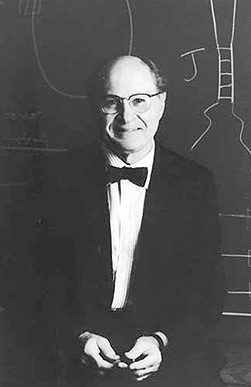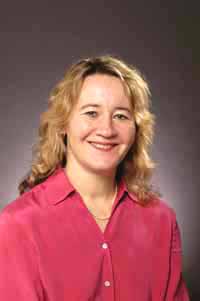 DANIEL NATHANS won the Nobel Prize in medicine in 1978, sharing the honor with his colleague, fellow Hopkins professor Hamilton O. Smith, Med 1956, and Swiss microbiologist Werner M. Arber. Dr. Nathans earned the high honor for his contributions to the discovery and use of a restriction enzyme as “biochemical scissors” to break apart and analyze DNA. This research paved the way for the entire field of genetic engineering and helped launch the biotechnology revolution. In 1993, he received the nation’s highest scientific award, the National Medal of Science.
DANIEL NATHANS won the Nobel Prize in medicine in 1978, sharing the honor with his colleague, fellow Hopkins professor Hamilton O. Smith, Med 1956, and Swiss microbiologist Werner M. Arber. Dr. Nathans earned the high honor for his contributions to the discovery and use of a restriction enzyme as “biochemical scissors” to break apart and analyze DNA. This research paved the way for the entire field of genetic engineering and helped launch the biotechnology revolution. In 1993, he received the nation’s highest scientific award, the National Medal of Science.
Dr. Nathans joined the faculty in 1962 and went on to direct the Department of Microbiology, later renamed the Department of Molecular Biology and Genetics. He served as interim president of the university from 1995 to 1996. Dr. Nathans, who died in 1999, was a distinguished scientist and a beloved teacher and mentor.
“…Remember to care for the whole person. Medicine is a noble profession. It’s much more than applied science, and it is much more than the bottom line.”
-Daniel Nathans
Held by Carol Greider
 CAROL GREIDER, PhD received her bachelor’s degree from the University of California at Santa Barbara in 1983 and a PhD in 1987 from the University of California at Berkeley. In 1984, working together with Dr. Elizabeth Blackburn, she discovered telomerase, an enzyme that maintains telomeres, or chromosome ends. In 1988, Dr. Greider went to Cold Spring Harbor Laboratory where, as an independent Cold Spring Harbor Fellow, she cloned and characterized the RNA component of telomerase. In 1990, Dr. Greider was appointed as an assistant investigator at Cold Spring Harbor Laboratory, followed later by appointment to Investigator in 1994. She expanded the focus of her telomere research to include the role of telomere length in cellular senescence, cell death and in cancer. In 1997, Dr. Greider moved her laboratory to the Department of Molecular Biology and Genetics at The Johns Hopkins University School of Medicine. In 2003 she was appointed as the Daniel Nathans Professor and Director of the Department of Molecular Biology and Genetics. At Johns Hopkins University, Dr. Greider’s group continued to study the biochemistry of telomerase and determined the secondary structure of the human telomerase RNA. In addition she characterized the loss of telomere function in mice, which allowed an understanding of humans short telomere diseases such as bone marrow and other stem cell failure diseases. Dr. Greider shared the Nobel Prize in Physiology or Medicine in 2009 with Drs. Elizabeth Blackburn and Jack Szostak for their work on telomeres and telomerase. Dr. Greider currently directs a group of eight scientists studying both the role of short telomeres in age-related disease and cancer as well as the regulatory mechanism that maintain telomere length.
CAROL GREIDER, PhD received her bachelor’s degree from the University of California at Santa Barbara in 1983 and a PhD in 1987 from the University of California at Berkeley. In 1984, working together with Dr. Elizabeth Blackburn, she discovered telomerase, an enzyme that maintains telomeres, or chromosome ends. In 1988, Dr. Greider went to Cold Spring Harbor Laboratory where, as an independent Cold Spring Harbor Fellow, she cloned and characterized the RNA component of telomerase. In 1990, Dr. Greider was appointed as an assistant investigator at Cold Spring Harbor Laboratory, followed later by appointment to Investigator in 1994. She expanded the focus of her telomere research to include the role of telomere length in cellular senescence, cell death and in cancer. In 1997, Dr. Greider moved her laboratory to the Department of Molecular Biology and Genetics at The Johns Hopkins University School of Medicine. In 2003 she was appointed as the Daniel Nathans Professor and Director of the Department of Molecular Biology and Genetics. At Johns Hopkins University, Dr. Greider’s group continued to study the biochemistry of telomerase and determined the secondary structure of the human telomerase RNA. In addition she characterized the loss of telomere function in mice, which allowed an understanding of humans short telomere diseases such as bone marrow and other stem cell failure diseases. Dr. Greider shared the Nobel Prize in Physiology or Medicine in 2009 with Drs. Elizabeth Blackburn and Jack Szostak for their work on telomeres and telomerase. Dr. Greider currently directs a group of eight scientists studying both the role of short telomeres in age-related disease and cancer as well as the regulatory mechanism that maintain telomere length.
 DANIEL NATHANS won the Nobel Prize in medicine in 1978, sharing the honor with his colleague, fellow Hopkins professor Hamilton O. Smith, Med 1956, and Swiss microbiologist Werner M. Arber. Dr. Nathans earned the high honor for his contributions to the discovery and use of a restriction enzyme as “biochemical scissors” to break apart and analyze DNA. This research paved the way for the entire field of genetic engineering and helped launch the biotechnology revolution. In 1993, he received the nation’s highest scientific award, the National Medal of Science.
DANIEL NATHANS won the Nobel Prize in medicine in 1978, sharing the honor with his colleague, fellow Hopkins professor Hamilton O. Smith, Med 1956, and Swiss microbiologist Werner M. Arber. Dr. Nathans earned the high honor for his contributions to the discovery and use of a restriction enzyme as “biochemical scissors” to break apart and analyze DNA. This research paved the way for the entire field of genetic engineering and helped launch the biotechnology revolution. In 1993, he received the nation’s highest scientific award, the National Medal of Science.